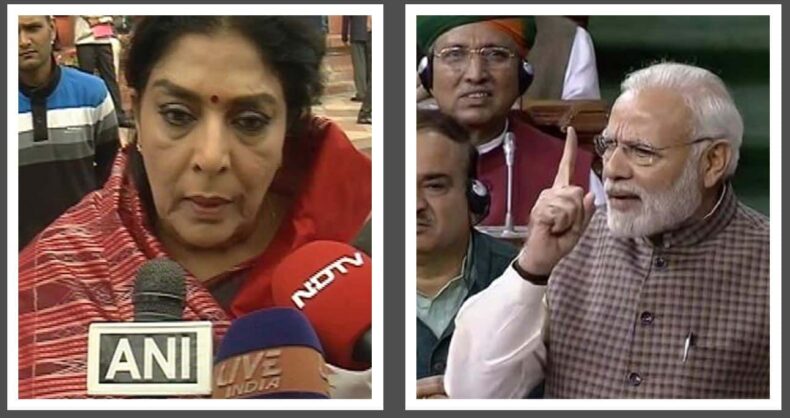A derogatory comment sparked a verbal spat between Former Union Minister Renuka Chaudhary and Mr Narendra Modi.

The former Union Minister Renuka Chaudhary will file a defamation case against Mr Narendra Modi’s derogatory comment ‘Surpnakha’ in Parliament in 2018. She tweets with a clip from the 2018 Parliament session when Mr Narendra Modi referred to the character that she played in a TV programme, The Ramayana.
Amid the disturbance in the Parliament while Mr Narendra Modi was speaking, he compared Reunka Chaudhary’s laughter to Surpnakha’s laughter in the Ramayana and said, “After the Ramayana serial, they got an opportunity to hear this laughter for the first time.”
The verbal spat between the two, Narendra Modi and Renuka Chawdhary began after Rahul Gandhi, who is an Indian Politician and Member of the Parliament from the constituency of Wayanad in Kerela was held guilty of a criminal defamation case for passing remarks on Modi’s surname in the year 2019. Calling Mr Modi a ‘Classless Megalomaniac’ Renuka Chaudhary wants to see how fast the Indian courts work now if she files a complaint against the Prime Minster of the Country.
REMARKS ON MODI SURNAME

A defamation case was filed against Mr Rahul Gandhi by a BJP MLA from Surat, Mr Purnesh Modi. He claims that Mr Rahul Gandhi wanted to defame the entire Modi community and hence passed the comment, “How come all the thieves have Modi as the common surname.” But Rahul Gandhi dismisses allegations and claims he never said anything against the Modi surname.
Mr Rahul Gandhi claims If he ever said that, the statement was general and did not point towards anyone in particular. Mr Rahul Gandhi got arrested under sections 499 and 500 of the Indian Penal code and sentenced to two years of jail. He got bail on a surety of Rs. 1,500 for 30 days, as of now, to file an appeal against the decision.
SECTIONS 499 AND 500 EXPLAINED

According to the dictionary, Defamation means ‘an act of communicating the false statement about a person that injures the reputation. It is covered under the law of Torts and Section 499 under the Indian Penal code asserts that if any person passes a comment on someone’s character, dead or alive, directly or indirectly, to destroy another person’s reputation.
The person will be booked under section 499 of the IPC. One cannot hurt the sentiments of the person and relatives. The Apex Court of India asserts that this is a reasonable restriction on the right to freedom of speech under article 19 (1)(a) of the Constitution. The person defamed by another has the right to sue that person for defamation and can either move High court or the Subordinate courts and ask for monetary compensation from that person.
According to section 500, which is, related to the punishment in the Defamation case, the person who is involved in defaming another person is entitled to simple imprisonment that can extend to two years of imprisonment with a fine, or both.
Subramanian Swami V. said a person is not expected to tolerate a rush which may tarnish the reputation of a person because obviously, dignity matters.












